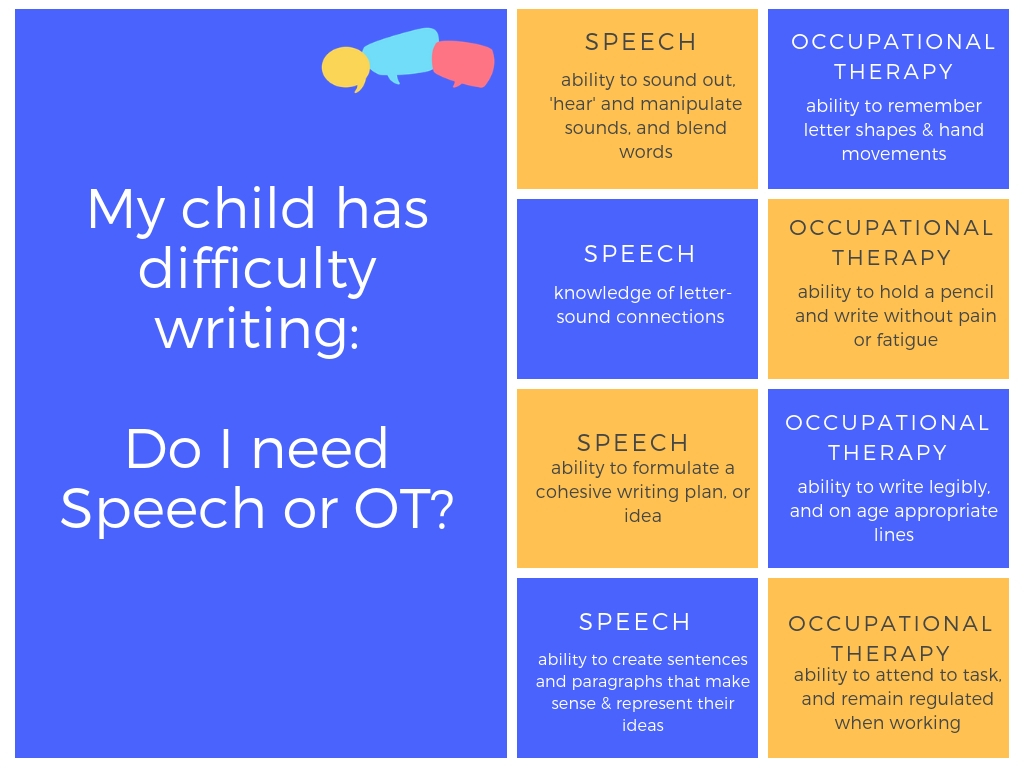Helping children with writing: Speech Pathology or Occupational Therapy?
Is your child finding writing hard?
If you’ve ever watched your child sit down and try to write their sentences for homework, and seen their struggle, you may have wondered what the best way to help might be.
We get it. Writing sentences, and expressing ourselves through writing paragraphs is hard! Every day we work with children who are finding writing difficult, and our job is to break down the reasons behind the difficulty, and make a plan toward success.
As tertiary qualified allied health professionals, Speech Pathologists and Occupational Therapists can help children develop the skills needed for great writing.

At school, writing is essential for success.
We want children to be confident writers, who clearly and easily express their thoughts on different topics, and ideas. Writers who can pick up a pencil, and find enjoyment in self expression, rather than finding frustration in staring at a blank page.
The academic curriculum is founded on writing, children need to be able to confidently write sentences in Prep, and quickly progress onto connected sentences, paragraphs and stories.
Writing is one of the most complex skills children face.
The ability to produce connected, cohesive text that expresses a clear main idea, with a variety of interesting sentences and vocabulary in clear handwriting is no easy task.
Writing is a composite skill, depending on many foundational skills to all work together in unison, and we often see that the breakdown in any one of these foundational areas can be enough to cause a barrier or block in the writing process.
What skills are needed?
1. Children need to be able to form a clear idea, that is on topic.
2. They need to be able to sequence this idea, and identify where to start in their writing.
3. Then, isolate the initial idea, and build a sentence that matches this idea.
4. Then, holding that one sentence in their mind, isolate the first word to write.
5. Write that first word – by segmenting the sounds to spell, or recalling the spelling from memory.
6. While writing – sit up (posture is important), hold the pencil, and manipulate the pencil to produce clear, legible letters by remembering the motor plan that matches each letter.
7. Repeat – for each of the words in the sentence (without losing your overall idea)
8. Use punctuation at the start, and end of this sentence.
9. Complete the paragraph, and then edit, checking for spelling, sentence structure, cohesion, and relevance to the topic.
As you can see – it’s pretty tricky.
A breakdown in any of the areas above, caused by oral language difficulties, fine motor difficulty, or even just reduced confidence can lead to significant frustration and even writing refusal.
Speech Pathologists and Occupational Therapists can help.
SPs and OTs often work in unison – with the OT’s working on the mechanical side of writing (posture, fine motor, strength, flexibility, motor planning, letter formation) and the SPs working on the language aspects (sentence structure, idea formation, spelling etc).
Check out this infographic which highlights who can help.. with what?!

The Key is.. starting early.
At the first sign of writing difficulties, it’s best to make contact. Working on improving the writing process takes time, and building confidence also. Don’t hesitate to contact us if you have questions about how we can help your child develop this really important skill !
Our Client Journey Planning sessions are the best place to start, to speak with either an SP or OT, to discuss any concerns you have about your child’s writing abilities, and determine where it is best to begin to help.
Contact us today on 3265 4495 or [email protected]

Written by Speech Pathologist, Marion Giddy, Date last reviewed June 2025
